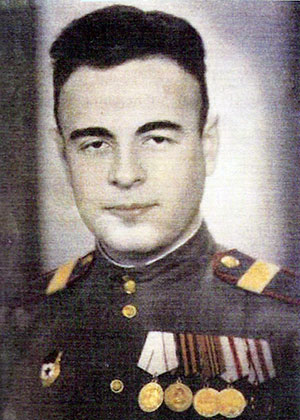
Zinovi Knel
Zinovi Knel was born in 1927 in the small town of Lyuban (the Minsk Region, Belorussia), in a Jewish family. His father Berl worked as a hostler, while his mother was a homemaker. The family had five children: Zinovi and his four sisters.
On June 22, 1941, following the German invasion of the USSR, Zinovi's father was drafted into the Red Army, leaving his 14-year-old son (who was nicknamed "Zelik") in charge of the family.
Five days later, on June 27, Lyuban was occupied by the Germans. Most of the able-bodied Jewish men were shot during the very first days of the occupation, while the remaining Jews were imprisoned in a hastily established ghetto, which existed for several months. Throughout this time, Zinovi managed to hide from the Germans and their local collaborators. On December 4, 1941, the Nazis, together with the local Auxiliary Police, massacred the surviving ghetto inmates. Zinovi Knel's mother and sisters were killed, but he was able to survive with difficulty, making his way out of a corpse-filled ditch. For a week, he wandered from place to place, hiding from potential pursuers. He then had the good fortune of coming across a partisan unit, which took him in after he falsely claimed to be 17 years old. He served there under the assumed name "Zhenya Grigoryev," later acquiring the nicknames "Zhenya the Commandant" and "Zhenya the Oakfeller." Initially, his job was provisioning the new recruits, but this did not satisfy his desire to take revenge on the Germans, and so he managed to get himself assigned to reconnaissance duty. By that time, he had been taught to shoot, and was able to understand German thanks to his knowledge of Yiddish. Zelik Knel stayed with the partisans until 1944, taking part in ambushes, the storming of German garrisons, and the capture of policemen and members of local administrations. He occasionally had to deal with manifestations of antisemitism on the part of his comrades. He would later recall one such incident:
"While we remained in the Lyuban region, I was treated well, as were all the other recruits. Such treatment was characteristic of an ordinary "Soviet eastern" partisan unit. However, the attitude in the Pinsk area was variable. I did not look like a typical Jew, and was known to everyone as 'Zhenya Grigoryev'. However, I made no attempt to conceal my nationality. There were conflicts and insults...
Once, the unit went out to blow up a military train, and our job was covering the demolition team. On our way back, we stopped at a farmstead, and sat down at a table. Then, one of the demolitionists, who had previously served in a unit that had been encircled, blurted out: 'Kikes don't fight!'. I instantly smacked him on the head with a bottle of moonshine, and he grabbed his machine gun... It took a lot of effort to calm him down..."1
In July 1944, after the liberation of Belorussia, Zinovi Knel was recruited into the Red Army and given the rank of junior sergeant. He enlisted under his real name, discarding the alias that he had used in previous years. He was assigned to a reconnaissance company, where his duties included escorting valuable prisoners, eliminating sabotage teams, and combing through liberated zones.
In late April 1945, during the Battle of Berlin, Zinovi's unit managed to capture a German archive and a cache of secret documents kept at the Reich Chancellery.
Zinovi Knel received numerous medals. In 1944, when Knel was still with the partisans, his comrades petitioned the authorities to have him decorated with the Order of the Red Star, but received no reply.
After the end of the war, Zinovi Knel remained in Germany for several years, serving in the Soviet occupation force. His father Boris, who had been in the military throughout the war, survived and returned to Belorussia.
Following his discharge, Knel moved to Minsk, where he graduated from the Belarusian Institute of National Economy in 1958, qualifying as an economist.
In 1979, Zinovi Knel moved to Israel with his family.
In 2016, he published an autobiographical book titled The Oakfeller Order.
Zinovi Knel died in 2019 in Ashdod (Israel).






